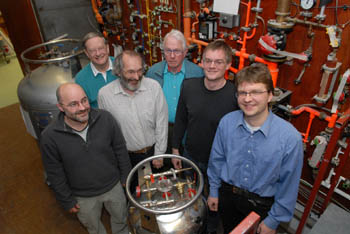International Recognition for Lancaster’s Coolest Lab

Lancaster University’s leading position in the ultralow temperature field has been recognised with its designation as a European centre for international researchers.
With funding from the EU announced this month, The Physics Department’s Ultralow Temperature suite joins similar facilities in Helsinki and Grenoble to create a core of three centres intended to provide scientists from across Europe with access to state-of-the-art facilities beyond the capabilities of single institutions and even nation states.
These three laboratories will form the core of a wider network of European laboratories including, Heidelberg, Royal Holloway in London, the Italian National Nanoscience Centre, Slovak Academy of Sciences, Basel, Delft, Leiden and Berlin, which will work on common projects.
The project is called “Microkelvin”, the name of the temperature unit of one millionth of a degree above absolute zero, and will cost four million Euros, with Lancaster receiving 800,000 Euros. Its principal aim is to exploit Europe’s lead in microkelvin physics by opening very low temperatures to experimental nanoscience. This takes nanoscale behaviour to a new regime of temperature where thermal disturbance is minimised and the behaviour of materials enters the realm of quantum mechanics, leading to new physics and novel devices for science and medicine.
Professor George Pickett said: “This is a great honour for Lancaster. Europe is ideally suited to undertake such research as the European low temperature physics effort leads the world.”
The project includes a range of objectives, from the opening of existing facilities to visiting workers, to the development of new advanced machines such as the development of mobile microkelvin installations which can be used in any laboratory without the need for expensive supporting infrastructure. The full range of scientific and technological activity is covered, from blue-skies fundamental research to the development of commercial machines and devices.
Physics at Lancaster is ranked first in the UK for world leading research excellence, in the latest national Research Assessment Exercise (RAE).